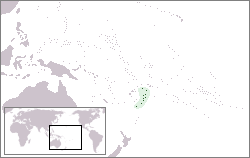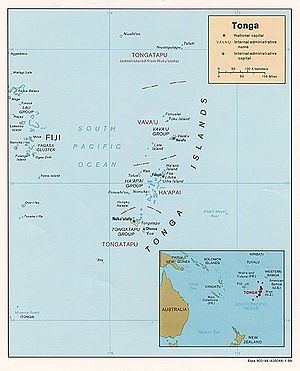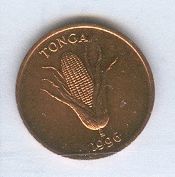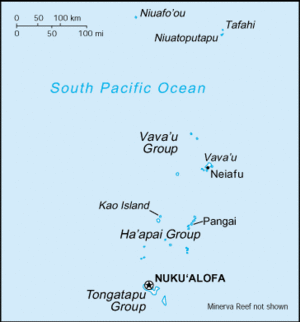Tonga
The Kingdom of Tonga is an independent country situated in the archipelago of the same name in the southern Pacific Ocean, about a third of the way between New Zealand and Hawaii. It lies south of Samoa and east of Fiji. Settled for more than 2800 years, Tonga is part of the cradle of Polynesian civilisation (with Samoa and Fiji). Also known as “The Friendly Islands,” Tonga always retained control of its own government, although the monarchy is under pressure from a pro-democracy movement seeking greater representation, and more accountability by the monarch. Tongan people have made their mark as star rugby players with the New Zealand All Blacks, as creative artists, as hip-hop and opera singers. Everyday life is heavily influenced by the Christian faith. In Tongan culture, there are strict gender roles.
| |||||
| National motto: Ko e Otua mo Tonga ko hoku tofi'a (God and Tonga Are My Heritage) | |||||

| |||||
| Principal languages | Tongan, English | ||||
| Capital | Nuku'alofa | ||||
| King | Taufa'ahau Tupou IV | ||||
| Acting prime minister | Feleti Sevele | ||||
| Area - Total - % water |
Ranked 171st 748 km² 4% | ||||
| Population - Total (2005 est.) - Density |
Ranked 178th 112,422 137/km² | ||||
| Currency | Pa'anga | ||||
| Time zone | Universal Time +13 | ||||
| Independence | 1970 | ||||
| National anthem | Koe Fasi Oe Tu'i Oe Otu Tonga (Oh Almighty God Above, Thou Art Our Lord and Sure Defence) | ||||
| Internet TLD | .to | ||||
| Country calling code | 676 | ||||
Geography
The Tongan archipelago consists of 169 islands, 36 of them inhabited, and is divided into three main groups — Vava'u, Ha'apai, and Tongatapu, which lie along an 800 km north-south line. The largest island, Tongatapu, on which the capital city of Nuku'alofa is located, covers 257 square kilometers.
Geologically, the Tongan islands are either volcanic islands rising directly from the ocean floor (e.g. Kao and Tofua in the Ha'apai group), or seismically uplifted coral limestone islands overlaying an older volcanic base (e.g., Tongatapu). The active volcanic islands are situated in an approximate north-south line located west of the more populated islands. A new volcanic island broke the ocean's surface in the Ha'apai group during the 1990s.
The climate is subtropical with a distinct warm period (December-April), during which the temperatures rise above 32 C, and a cooler period (May-November), with temperatures rarely rising above 27 C. The temperature increases from 23 C to 27 C, and the annual rainfall is from 1,700 to 2,970 mm as one moves from Tongatapu in the south to the more northerly islands closer to the Equator. The mean daily humidity is 80 percent.
Some environmental issues facing Tonga include deforestation, as more and more land is cleared for agriculture and settlement, and some damage to coral reefs from starfish and indiscriminate coral and shell collectors. Overhunting threatens native sea turtle populations. Natural hazards include cyclones from October to April, as well as earthquakes and volcanic activity on Fonuafo'ou.
History
Archaeological evidence shows that the first settlers in Tonga sailed from the Santa Cruz Islands, as part of the original Austronesian-speakers' (Lapita) migration out of Southeast Asia some 6000 years ago. Tonga is the oldest known site in Polynesia for the distinctive Lapita ceramic ware, approximately 2800 years ago. The "Lapita" people lived and sailed, traded, warred, and intermarried in the islands now known as Tonga, Samoa, and Fiji for 1000 years, before more explorers set off to the east and discovered the Marquesas, Tahiti, and the rest of the Pacific islands. Anthropologists describe Tonga, Samoa, and Fiji as the cradle of Polynesian culture and civilization.
By the 12th century, Tongans and their paramount chief, the Tu'i Tonga, were known across the Pacific, from Niue to Tikopia. Some historians to refer to that period as a Tongan Empire, although it may better be described as a network of interacting navigators, chiefs, and adventurers, like the Scandinavian kingdoms and the Vikings. Civil war erupted in the 15th century and again in the 17th. Dutch explorers Willem Schouten and Jacob Le Maire were the first Europeans to arrive in 1616. They visited the northern island of Niuatoputapu. Abel Tasman visited Tongatapu and Ha'apai in 1643. The English Captain Cook visited in 1773, 1774, and 1777, the first London missionaries landed in 1797, and the Methodist Walter Lawry Buller arrived in 1822.
The ambitious young warrior, strategist, and orator Taufa'ahau united Tonga into a Polynesian kingdom in 1845 by. He held the chiefly title of Tu'i Kanokupolu, but was baptized with the name King George. In 1875, with the help of missionary Shirley Baker, he declared Tonga a constitutional monarchy, formally adopted the Western royal style, emancipated the serfs, enshrined a code of law, land tenure, and freedom of the press, and limited the power of the chiefs.
Also known as the Friendly Islands, Tonga became a British protected state under a Treaty of Friendship in 1900, when European settlers and rival Tongan chiefs tried to oust the second king. Within the British Empire, which posted no higher permanent representative on Tonga than a British consul, it was since 1901 part of the British Western Pacific Territories (under a High Commissioner, on Fiji) until 1952.
The Treaty of Friendship and protectorate status ended in 1970 under arrangements established prior to her death by Queen Salote Tupou III. Tonga joined the Commonwealth of Nations in 1970 (atypically as an autochthonous monarchy), and the United Nations in 1999. While exposed to colonial forces, Tonga has never lost indigenous governance, a fact that makes Tonga unique in the Pacific and gives Tongans much pride, as well as confidence in the monarchal system. The British High Commission in Tonga was scheduled to close in 2005.
Politics
Tonga is a hereditary monarchy. The reverence for the kingship is likened to that held in prior centuries for the sacred paramount chief, the Tu'i Tonga. Criticism of the monarch is held to be antithetical to Tongan culture and etiquette. A direct descendant of the first monarch, King Taufa'ahau Tupou IV, his family, some powerful nobles, and a growing non-royal caste of elites live in much wealth, with the rest of the country living in relative poverty. The effects of this disparity are mitigated by free education, socialised medicine, and the fact that land cannot be sold to foreigners.
The executive comprises: chief of state King Taufa'ahau Tupou IV (since 16 December 1965), acting Prime Minister (the elected minister of labour) Dr. Feleti Sevele, and Deputy Prime Minister James C. Cocker (since January 2001). The cabinet consists of 16 members, 12 appointed by the monarch for life; four appointed from among the elected members of the Legislative Assembly including two each from the Nobles.
There is a unicameral legislative assembly or Fale Alea, consisting of 30 seats, 12 of which are reserved for cabinet ministers sitting ex officio, nine for nobles selected by the country's 33 nobles, and nine elected by popular vote. Members serve three-year terms. Elections were last held in March 2005. The Human Rights and Democracy Movement of Tonga took seven seats and independents two.
The government of Tonga under King Taufa'ahau Tupou IV put the economy on a monetary basis, internationalized the medical and education system, and enabled access by commoners to houses, cars, and other commodities, education, and overseas travel. The government has supported Olympic and other international sports competition, and contributed peacekeepers to the United Nations (notably to Bougainville). The Tongan government also supported the American "coalition of the willing" action in Iraq, and a small number of Tongan soldiers were deployed, as part of an American force, to Iraq in late 2004. However, the contingent of about 40 troops returned home later that year.
King Taufa'ahau and his government have made poor decisions in attempts to increase national revenue through: searching for oil, despite geological reports indicating no possible oil; considering making Tonga a nuclear waste disposal site; selling Tongan Protected Persons Passports, which forced Tonga to nationalize the purchasers, sparking ethnicity-based concerns within Tonga; registering foreign ships, which proved to be engaged in illegal activities; claiming geo-orbital satellite slots, the revenue from which seems to belong to the Princess Royal, not the state; holding a long-term charter on an unusable Boeing 757 that was sidelined in Auckland Airport; building an airport hotel and potential casino with an Interpol-accused criminal; and approving a factory for exporting cigarettes to China, against the advice of Tongan medical officials and decades of health promotion messaging. The king has proved vulnerable to speculators. He lost several million (reportedly US$26 million) to Jesse Bogdonoff, a financial adviser who called himself the king's court jester.
Pro-democracy movement
There is a pro-democracy movement in Tonga, which seeks better representation in Parliament for commoners, who make up the majority, and better accountability in matters of state. The movement does not aim to overthrow the monarchy, which continues to hold popular support, even while reforms are advocated. Until recently, other countries ignored the governance issue, but aid donors and neighbors New Zealand and Australia have expressed concerns about some Tongan government actions.
The police have imprisoned pro-democracy leaders, and the government repeatedly confiscated the newspaper The Tongan Times (which was printed in New Zealand and sold in Tonga) because the editor had been vocally critical of the king's mistakes. Notably, the Kele'a, produced specifically to critique the government and printed in Tonga by pro-democracy leader 'Akilisi Pohiva, was not banned during that time. Pohiva, however, had been subjected to harassment in the form of frequent lawsuits.
In mid-2003, the government passed a constitutional amendment to license and limit the freedom of the press, to protect the image of the monarchy. Licensure criteria include 80 percent ownership by Tongans living in the country. Those papers denied licenses under the new act included the Taimi 'o Tonga (Tongan Times), the Kele'a and the Matangi Tonga, while those which were permitted licenses were uniformly church-based or pro-government.
The bill was opposed in the form of a several-thousand-strong protest march in the capital, a call by the Tu'i Pelehake (a prince, nephew of the king and elected member of parliament) for Australia and other nations to pressure the Tongan government to democratize the electoral system, and a legal writ calling for a judicial investigation of the bill. The latter was supported by some 160 signatories, including seven of the nine elected "People's Representatives". The strong-arm tactics and gaffes have overshadowed the good that the now-aged king has done, as well as reforms of his son, 'Ulukalala Lavaka 'Ata, who was prime minister from 2000 to 2006. The crown prince, Tupouto'a, and Pilolevu, the princess royal, remained silent on the issue.
In 2005 the government spent several weeks negotiating with striking civil service workers before reaching a settlement. The civil unrest that ensued was not limited to just Tonga; protests outside the king's New Zealand residence made headlines, too. A constitutional commission is currently (2005-06) studying proposals to update the constitution.
Economy
Tonga's economy is characterized by a large nonmonetary sector and a heavy dependence on remittances from the half of the country's population that lives abroad, chiefly in Australia, New Zealand, and the United States. The monetary sector of the economy is dominated and largely owned by the royal family and nobles. This is particularly true of the telecommunications and satellite services. Much of small business, particularly retail establishments on Tongatapu, is now dominated by recent Chinese immigrants who arrived under a cash-for-passports scheme ended in 1998.
The manufacturing sector consists of handicrafts and a few other very smallscale industries, all of which contribute only about 3 percent of GDP. Commercial business activities also are inconspicuous and, to a large extent, are dominated by the same large trading companies found throughout the South Pacific. In September 1974, the country's first commercial trading bank, the Bank of Tonga, opened.
Rural Tongans rely on plantation and subsistence agriculture. Coconuts, vanilla beans, and bananas are the major cash crops. The processing of coconuts into copra and desiccated coconut is the only significant industry. Pigs and poultry are the major types of livestock. Horses are kept for draft purposes, primarily by farmers working their api. More cattle are being raised, and beef imports are declining.
Tonga's development plans emphasize a growing private sector, upgrading agricultural productivity, revitalizing the squash and vanilla bean industries, developing tourism, and improving the island's communications and transportation systems. Substantial progress has been made, but much work remains to be done. A small but growing construction sector is developing in response to the inflow of aid monies and remittances from Tongans abroad. The copra industry is plagued by world prices that have been depressed for years.
Efforts are being made to discover ways to diversify. One hope is seen in fisheries; tests have shown that sufficient skipjack tuna pass through Tongan waters to support a fishing industry. Another potential development activity is exploitation of forests, which cover 35% of the kingdom's land area but are decreasing as land is cleared. Coconut trees past their prime bearing years also provide a potential source of lumber.
The tourist industry is relatively undeveloped; however, the government recognizes that tourism can play a major role in economic development, and efforts are being made to increase this source of revenue. Cruise ships often stop in Nuku'alofa and Vava'u.
Demographics
Almost two-thirds of the Tongan population, of 112,000 (in July 2005) lives on its main island, Tongatapu. Although an increasing number of Tongans have moved into the only urban and commercial centre, Nuku'alofa, where European and indigenous cultural and living patterns have blended, village life and kinship ties continue to be important throughout the country. Everyday life is heavily influenced by Polynesian traditions and especially by the Christian faith; for example, all commerce and entertainment activities cease from midnight Saturday until midnight Sunday, and the constitution declares the Sabbath to be sacred, forever.
Tongans, a Polynesian group with a very small mixture of Melanesian, represent more than 98 per cent of the inhabitants. The rest are European, mixed European, and other Pacific Islanders. There also are several hundred Chinese.
Culture
The Tongan language (faka-Tonga) is an Austronesian language spoken in Tonga. It has 100,000 speakers and is a national language of Tonga. It is a verb-subject-object language. Tongan is one of the many tongues in the Polynesian branch of the Austronesian languages, along with Hawaiian, Maori, Samoan and Tahitian. Together with Niuean, it forms the Tongic subgroup of Polynesian. Assuming that the Polynesian languages have developed from a (real or imaginary) ancient language referred to as Proto-Polynesian, it seems that in Tongic the phonology has changed the least. English is also spoken. The English word "taboo" is a loan word from Tongan.
The church has been central to the identity and culture of Tongans. For example, all commerce and entertainment cease from midnight Saturday until midnight Sunday, and the constitution declares the Sabbath to be sacred, forever. According to the 1996 census, 41 percent belonged to the Free Wesleyan Church of Tonga, 16 percent were Roman Catholic, 14 percent belonged to the Church of Jesus Christ of Latter-day Saints (Mormons), the Free Church of Tonga had 12 percent, and others 17 percent. Members of the Tokaikolo Church (a local offshoot of the Methodist Church), Seventh-day Adventists, Assembly of God, Anglicans, the Baha'i Faith, Islam, and Hinduism are represented in much smaller numbers. There were no reports of atheists.
Tongan culture has strict gender roles. Girls are taught to be submissive and are expected to stay at home. Boys are raised to be independent. Men have more political power, but women are ranked higher in the community. Women and men have equal access to education and health care, and are fairly equal in employment, but women are discriminated against in land holding, electoral politics, and government ministries. The Tongan words for homosexuals are fakaleitī (like a lady) and fakatangata (like a man). When not sexually active, these people are ignored. If sexually active, they are condemned as perverts.
Primary education between ages six and 14 is compulsory and free in state schools. Mission schools provide about 83 percent of the primary and 90 percent of the secondary level education. Higher education includes teacher training, nursing and medical training, a small private university, a women's business college, and a number of private agricultural schools. Most higher education is pursued overseas. Tongans are well-educated, with a 98 percent literacy rate, and higher education up to and including medical and graduate degrees. Fees for secondary education are nominal. Foreign-funded scholarships are available for post-secondary education.
Tongans also have universal access to a socialized medicine system. Tongan land is constitutionally protected and cannot be sold to foreigners (although it may be leased).
Tongan diaspora
Many Tongans have emigrated to Australia, New Zealand, and the United States to seek employment and a higher standard of living. U.S. cities with significant Tongan American populations include East Palo Alto, California, Oakland, California, Los Angeles, California, Salt Lake City, Utah, Honolulu, Hawaii, and Euless, Texas (near the Dallas/Fort Worth metroplex).
Trivia
- On either his 1773 or 1777 visit, Captain Cook presented a tortoise to the king. This tortoise, known thereafter as Tui Malila, lived to be either 188 or 192 years old. It is listed in the Guinness Book of Records as the oldest animal on record.
- Tonga is famous for being the location where Fletcher Christian forced William Bligh into an open boat during the mutiny on the HMS Bounty in 1789. Bligh briefly went ashore at Tofua, which was then heavily populated, in search of water. The Tongans rebuffed Bligh and killed a member of his crew, forcing Bligh back out into the open ocean. Bligh and his small crew eventually made their way to the Dutch East Indies, setting a record for the longest voyage in an open boat (several thousand nautical miles).
- In 1972, the military of Tonga took over the "micronation" Republic of Minerva, which had created an artificial island on the Minerva reefs.
- In Wil McCarthy's The Queendom of Sol, a series of science fiction novels, the Queen of Sol is said to be a descendant of the Tongan royal family.
- The Walt Disney film The Other Side of Heaven, is based on the real life story of a young missionary in Tonga, though the film was shot on location in the Cook Islands.
ReferencesISBN links support NWE through referral fees
- ^ The sun finally sets on our men in paradise, published on The Daily Telegraph, 21 March 2005
- ^ Iraq Coalition Troops, published on GlobalSecurity, 18 August 2005
- ^ No resolution in sight in Tonga, published on TVNZ, 30 August 2005
Melenaite Taumoefolau. 'Tongans', Te Ara - the Encyclopedia of New Zealand, updated 11-Jul-2005
External links
- CIA World Factbook: Tonga
- Interactive maps of Tonga
- Map of Tonga
- Official Tongan Government Portal
- Matangi Tonga online— news from Tonga
- Planet Tonga
Credits
New World Encyclopedia writers and editors rewrote and completed the Wikipedia article in accordance with New World Encyclopedia standards. This article abides by terms of the Creative Commons CC-by-sa 3.0 License (CC-by-sa), which may be used and disseminated with proper attribution. Credit is due under the terms of this license that can reference both the New World Encyclopedia contributors and the selfless volunteer contributors of the Wikimedia Foundation. To cite this article click here for a list of acceptable citing formats.The history of earlier contributions by wikipedians is accessible to researchers here:
The history of this article since it was imported to New World Encyclopedia:
Note: Some restrictions may apply to use of individual images which are separately licensed.





